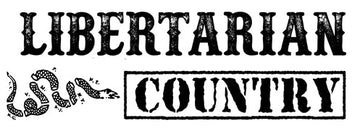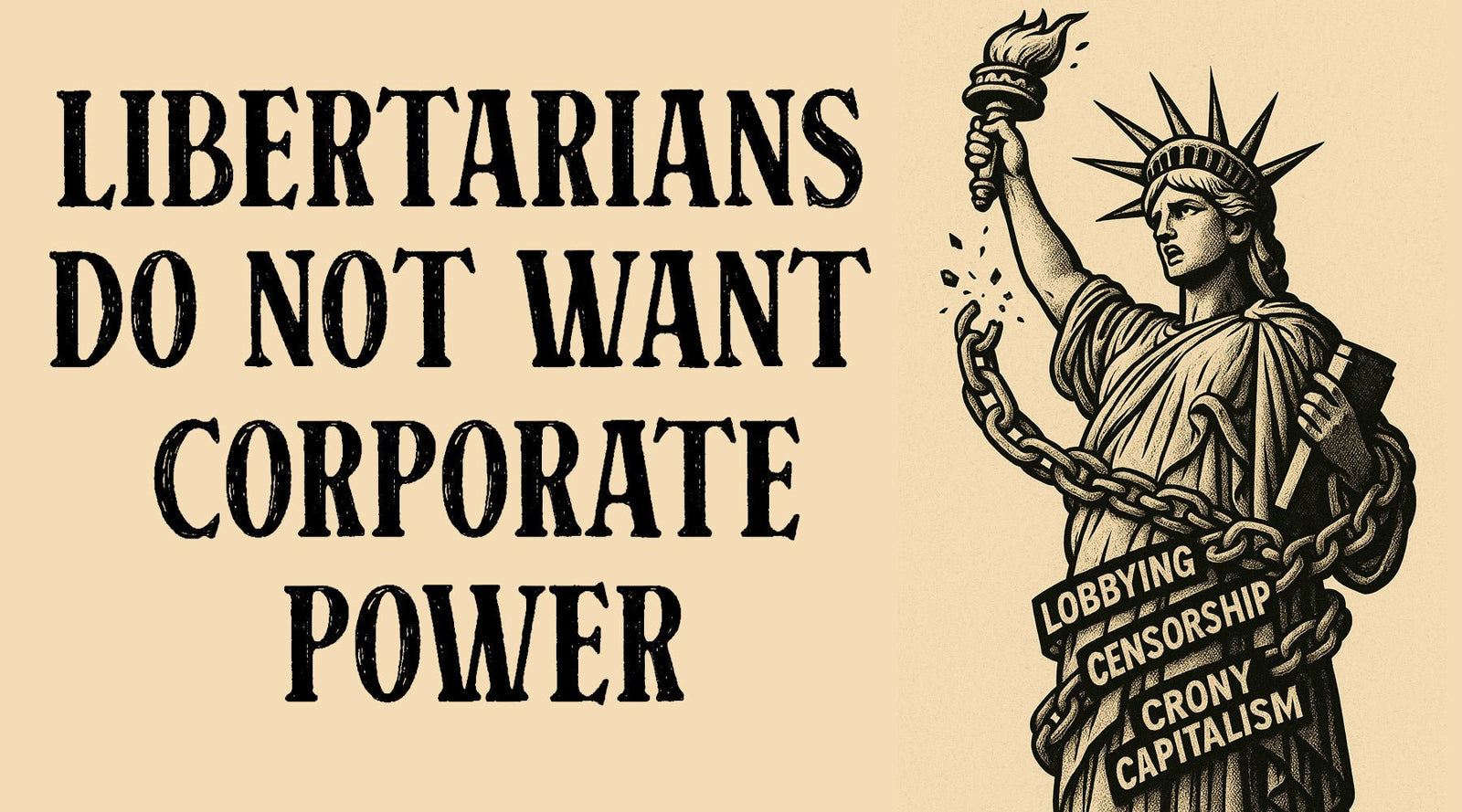For decades, critics of libertarianism have repeated the same tired refrain: “Libertarians just want to dismantle government so that corporations can run wild.” It’s a convenient accusation—simple, emotionally charged, and easily weaponized. But it’s also profoundly wrong.
Libertarians are not defenders of corporate domination. On the contrary, they are among the few political thinkers who actually oppose all forms of political power, whether exercised by governments or corporations acting as their proxies.
This misunderstanding stems from a fundamental confusion between economic power and political power—a distinction that lies at the very heart of libertarian philosophy.
Political Power: The Ultimate Disorder
Political power is not simply influence or persuasion—it is coercion. It is the authority to compel obedience under threat of punishment. Governments wield this power through law, regulation, taxation, and force. When a corporation or individual gains political power, they cease to operate under voluntary exchange and instead acquire the ability to impose their will on others.
Libertarians regard political power as the root of nearly every form of systemic corruption and abuse. It is not wealth itself that corrupts society, but the ability to translate wealth into coercion. Without political power, a billionaire can offer, persuade, or attempt to sell—but he cannot force you to buy, comply, or obey.
Political power is the ultimate disorder because it distorts the natural balance of voluntary human interaction. In a truly free market, relationships are based on consent. You choose to buy or not buy, to work or not work, to invest or walk away. But the moment coercion enters the equation—when a government creates privileges, subsidies, or monopolies—the system becomes rigged. Those with political connections gain unearned advantages over those who simply produce value.
That is the corruption libertarians despise.
Economic Power Without Political Power Is Harmless
A common mistake among critics is to conflate “economic power” with political power. They imagine that wealth itself is oppressive. Yet in a free market, economic power is nothing more than the ability to persuade others to engage in voluntary exchange.
If a company produces great products at low prices, it will gain customers, revenue, and market share. But the moment it stops serving customers well, competitors are free to arise and offer better alternatives. Economic power in this context is earned through value creation, and it can vanish overnight when innovation or consumer preference changes.
Contrast that with political power, which is protected by force. When a government grants special privileges—bailouts, subsidies, exclusive licenses, or regulatory barriers—it freezes the natural process of competition. The politically connected corporation no longer needs to serve customers to survive; it simply lobbies Congress.
That’s not capitalism. That’s corporatism. And libertarians reject it absolutely.
The Real Libertarian Critique of Big Business
Libertarians are often portrayed as defenders of “big business.” In reality, they are defenders of free markets, and those two things are not the same. In fact, most libertarians are fiercely critical of the ways major corporations use the state to entrench their dominance.
Consider the examples:
-
Big Tech has lobbied for complex regulations that make it nearly impossible for small competitors to enter the market.
-
Big Pharma benefits from government patent monopolies, lobbying, and protectionist laws that keep drug prices artificially high.
-
Big Food companies have shaped nutrition guidelines, labeling laws, and agricultural subsidies to favor industrial farming over local and organic producers.
-
Big Banks are protected by “too big to fail” bailouts, effectively privatizing profits and socializing losses.
In each case, the problem is not the corporation’s size or success—it’s the political privilege that shields it from accountability. Libertarians oppose this cronyism as much as they oppose socialism, because both rely on the same rotten principle: some people get to rule others.
The Libertarian Vision: A Market Without Masters
A libertarian society is one where no one—whether a politician or a CEO—can command the lives or property of others. The government does not exist to pick winners or losers, nor to enforce ideological agendas. Instead, laws exist only to protect individual rights: life, liberty, and property.
In such a system, corporations would have no political privileges. They would live or die based solely on their ability to satisfy voluntary customers. Fraud, theft, and coercion would remain illegal, but innovation and competition would be unrestrained.
This vision terrifies the political establishment because it strips both politicians and corporations of their mutual dependence. Without government power, corporations cannot buy influence. Without corporate donors, politicians cannot sell it. The revolving door between Capitol Hill and corporate boardrooms would slam shut.
That is true decentralization.
Critics Misunderstand Power
When progressives accuse libertarians of “wanting corporations to do whatever they want,” what they really mean is that libertarians want to remove government interference. But they fail to realize that most of what they call “corporate power” exists because of that interference.
Licensing laws, intellectual property expansions, subsidies, labor regulations, tariffs—these are all tools used to keep competitors out and the politically connected in. The Left sees government as the solution to corporate abuse, but libertarians recognize it as the source of it.
You cannot fix the arsonist by giving him more gasoline.
The cure is separation—separating the economy from the state just as we once separated church and state. The freer the market, the more difficult it becomes for any single entity to dominate.
Even Economic Power Has Its Limits
Libertarians are not naïve about economic concentration. We are critical of excessive corporate influence, manipulation, and the cultural dominance of megacorporations. We recognize that big business can distort society through advertising, lobbying, and control of platforms.
But we also recognize that such distortions are sustained by privilege, not freedom. In a free system, consumers and entrepreneurs constantly erode monopolies through innovation. Think of how Netflix destroyed Blockbuster, or how independent creators are now bypassing Hollywood through digital media. Power in the market shifts naturally and peacefully through choice, not revolution.
That dynamic process is what libertarians fight to preserve.
If You Dislike Corporate Power, Libertarianism Is Where You Belong
If you are genuinely outraged by the concentration of power among tech giants, pharmaceutical conglomerates, and political elites—if you resent the way they collude to censor, manipulate, and exploit—then libertarianism is not your enemy. It is your home.
Libertarianism does not defend corporate greed; it defends your freedom from it. It does not seek to let corporations “do whatever they want,” but to make sure no one—corporation or government—has the power to dictate your choices.
Under libertarianism, the rich cannot buy laws. Bureaucrats cannot sell them. Power must be earned, not granted.
The Final Word
The libertarian position can be summed up simply: we want to take power away from everyone who can use it against others. We distrust centralized authority, whether it’s in Washington or in Silicon Valley. We reject systems built on coercion, privilege, and control.
In a truly free society, corporations can produce, persuade, and innovate—but never rule. Government can protect rights—but never grant special favors. And individuals, through voluntary cooperation, can build prosperity without domination.
That is not anarchy. That is order born of liberty.
And if that world sounds appealing—if you long for a system where human relationships are governed by consent instead of coercion, merit instead of manipulation—then welcome home.
Libertarianism is the movement against power itself.
Fight for true free markets! Revolutionize the world in style! 👇


